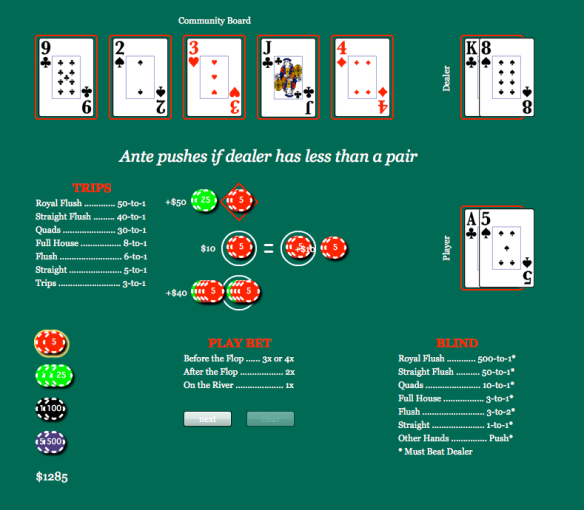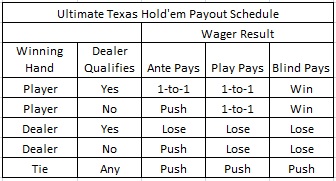Ultimate Texas Hold'em is a variation of Texas Hold'em, designed for those who like to play against the house. Its inventor is Roger Snow, a founder of the popular Internet portal ShuffleMaster.
Like with its predecessor Texas Hold’em, Wizard of Odds Ultimate Texas Hold’em practice is conducted using one deck of fifty-two cards Ante, Blind, and Trip wagers have to be equal. The latter is optional Both the dealer and gamer get two cards each. The player is allowed to look at theirs When placing stakes.

We are going to remind you that the gameplay has the following steps:
Ultimate Texas Holdem Practice
- The client makes two equal bets (ante and blind). Bonus bets are optional if they are provided.
- Two cards are dealt to the dealer and the player. The user can see only one of his cards.
- The client can check or make a Play bet that is equal to either three or four antes.
- The dealer faces up three community cards.
- If the player has already checked, he can make a Play bet in the amount of two antes. If he has already made a Play bet, bonus bets are not available for him.
- The croupier deals two additional community cards.
- If the player has checked twice, he can make a Play bet that is equal to one ante, or fold, losing his ante and blind. If he has already raised, he cannot raise more.
- Then the best five-card hands are formed. Seven cards take part in their formation.
The lowest-ranking dealer's hand is a pair.
Read in a separate article of the thematic section of the portal Casinoz about the comparison of hands, payouts, bonus bets, and other intricacies of the rules.
Basic optimal strategy
That’s not the case in Ultimate Texas Hold’Em. The house makes money because a mathematical edge is designed into the game. PLAYER SKILL MAKES A DIFFERENCE. If you know when to hold ’em and when to fold ’em, the house edge is 2.2 percent of your initial ante, or about 0.5 percent of your total bets. That means per $100 in antes, your losses will average $2.20. Most casinos that spread Ultimate Texas Hold’em don’t really mind when players discretely show their hands to their neighbors, or even flash the entire table. This is because overall, a player can’t gain much advantage by doing so.
Let's discuss the recommendations on the progressive card strategy Ultimate Texas Hold'em that is based on the mathematical calculations of the authors of the portal Wizard of Odds. Taking into account the fact that your further active steps can be reduced to the decision whether to raise or not and when to do it, our recommendations are limited to this issue.
Raise in the first round of betting
Let's firstly discuss when it is necessary to make a Play bet in the amount of four antes.
- A - users should make a 4x raise
- M - users should make a 4x raise if the cards are of one suit
- H - users should not make this bet
If you have a pair of threes and better, it is necessary to raise!!!
Raise in the second round of betting
It is possible to make a Play bet in the amount of two antes. This step may be beneficial in the following situations:
- Any pair (threes or better) if it has at least one pocket card.
- Two pairs or better.
- Four to a flush if one of its cards is a community card whose rank is over ten.
Raise in the third round of betting
Any pair or any other hand consisting of at least one pocket card.
It is also desirable to be able to count outs. It makes sense to raise if their number does not exceed 21.
We are going to remind you that the Play bet can be made only once per round, so if you have already made it, you will reach showdown in any case.
Bonus Bets
Ultimate Texas Hold'em provides the opportunity to make bonus bets of different types, but they are too unprofitable to be recommended to the client, who wants to earn. Therefore, you should better avoid them.
Conclusion
We hope that our recommendations and guide concerning the strategy for Casino Texas Hold'em will help you to achieve the best results. However do not start playing with real bets. First, you should master the ways to make right decisions at all stages of the table game and avoid mistakes.
Using the search engine on the website Casinoz, you will be able to find different models of this kind of poker and choose the most suitable version.
We are looking forward to seeing your comments about advanced strategy Ultimate Texas Hold'em and stories about your personal experience.
Thread Rating:
I guess my questions are
1) Approximately how long do you have to play quarters to generate $1250 in action. Just looking for a ball park number as I realize the dealer and the number of players at the table greatly effect the pace of play.
2) On bigger mistakes like when you bet 4x and lose and the dealer misreads and pays you and you win $125 instead of losing $150 doesn't this $275 swing destroy the house 2% edge.
Seems to me the game is beatable because of the high volume of dealer mistakes that take place. Anyone else have any thoughts on this.
Grandpa Vegas
I bet quarters and play the perfect strategy as the strategy tables show. I never play trips and bet 4x 2x and 1x where appropriate. What should this equate to in money bet per hour? I am making the assumption that for every $1250 I put in action I can only expect a return of $1225 after the fullness of time and the 2% hold levels out. Many times the dealer forgets they didn't qualify and you get paid on your ante bet. Well if you get paid on the ante when it should have been a push, doesn't that one little mistake make up the 2% for $1250 worth of action.
I guess my questions are
1) Approximately how long do you have to play quarters to generate $1250 in action. Just looking for a ball park number as I realize the dealer and the number of players at the table greatly effect the pace of play.
2) On bigger mistakes like when you bet 4x and lose and the dealer misreads and pays you and you win $125 instead of losing $150 doesn't this $275 swing destroy the house 2% edge.
Seems to me the game is beatable because of the high volume of dealer mistakes that take place. Anyone else have any thoughts on this.
Grandpa Vegas
I have no idea what you mean by 'hold'. The house edge is a lot lower than 2%, and it's based on the percentage of ante bets, not total action, so it is easier to calculate.
Dealer mistakes are common, you are right. If they pay the ante instead of pushing it 1-2x per hour you are breaking even or beating the game, before comps. If you have a dealer who can't read the board (which was common when the game first became popular -- a lot of non-poker-player dealers were clueless) it can be a goldmine.
2) On bigger mistakes like when you bet 4x and lose and the dealer misreads and pays you and you win $125 instead of losing $150 doesn't this $275 swing destroy the house 2% edge.
You can answer that question with the Wizard's numbers from the website. Dump them into a spreadsheet and for every line item you care about, change the average value to account for dealer mistakes. The new value will reflect the house edge under the assumed conditions (including your optimal play and dealer mistakes). If it's positive, well...
Administrator
I bet quarters and play the perfect strategy as the strategy tables show. I never play trips and bet 4x 2x and 1x where appropriate. What should this equate to in money bet per hour? I am making the assumption that for every $1250 I put in action I can only expect a return of $1225 after the fullness of time and the 2% hold levels out. Many times the dealer forgets they didn't qualify and you get paid on your ante bet. Well if you get paid on the ante when it should have been a push, doesn't that one little mistake make up the 2% for $1250 worth of action.
I guess my questions are
1) Approximately how long do you have to play quarters to generate $1250 in action. Just looking for a ball park number as I realize the dealer and the number of players at the table greatly effect the pace of play.
2) On bigger mistakes like when you bet 4x and lose and the dealer misreads and pays you and you win $125 instead of losing $150 doesn't this $275 swing destroy the house 2% edge.
Seems to me the game is beatable because of the high volume of dealer mistakes that take place. Anyone else have any thoughts on this.
Grandpa Vegas
FWIW, Harrah's LV is extremely concerned about exactly this and watching their hold carefully. With the addition of the in-house cross-platform 6 card bet, the dealer errors have become endemic, the game has slowed badly, and the only thing saving the game is that most people are scared to bet it properly and cut themselves out of taking full advantage. It's possible they'll work through it, but 3 weeks ago they were having a cow. (Don't think I'm giving anything away; they were openly discusssing the situation in front of the table several times over the week I was playing.)
I have no idea what you mean by 'hold'. The house edge is a lot lower than 2%, and it's based on the percentage of ante bets, not total action, so it is easier to calculate.
The hold is the amount a player leaves behind on average for a game. For a game like blackjack or texas hold 'em where people can not know the strategy the hold can be a lot larger than the edge.

The hold is the amount a player leaves behind on average for a game. For a game like blackjack or texas hold 'em where people can not know the strategy the hold can be a lot larger than the edge.
Ultimate Texas Holdem Rules
I know what hold means :) But I don't think that's what he meant by the term in this context.
The House advantage is 2.2% upon the average wager. The Wizard has calculated that optimal strategy will wager about 4.15 units per hand. This equates to about 0.53% per unit wagered (Element of Risk).
Ultimate Texas Holdem online, free
Oh, I guess I was wrong. For some reason I thought that the HE was 1.4%. Not sure where I got that number from.Ultimate Texas Hold Em Odds
EoR is not a useful measure here. Just multiply HE by your average ante size, and multiply that by number of hands per hour.